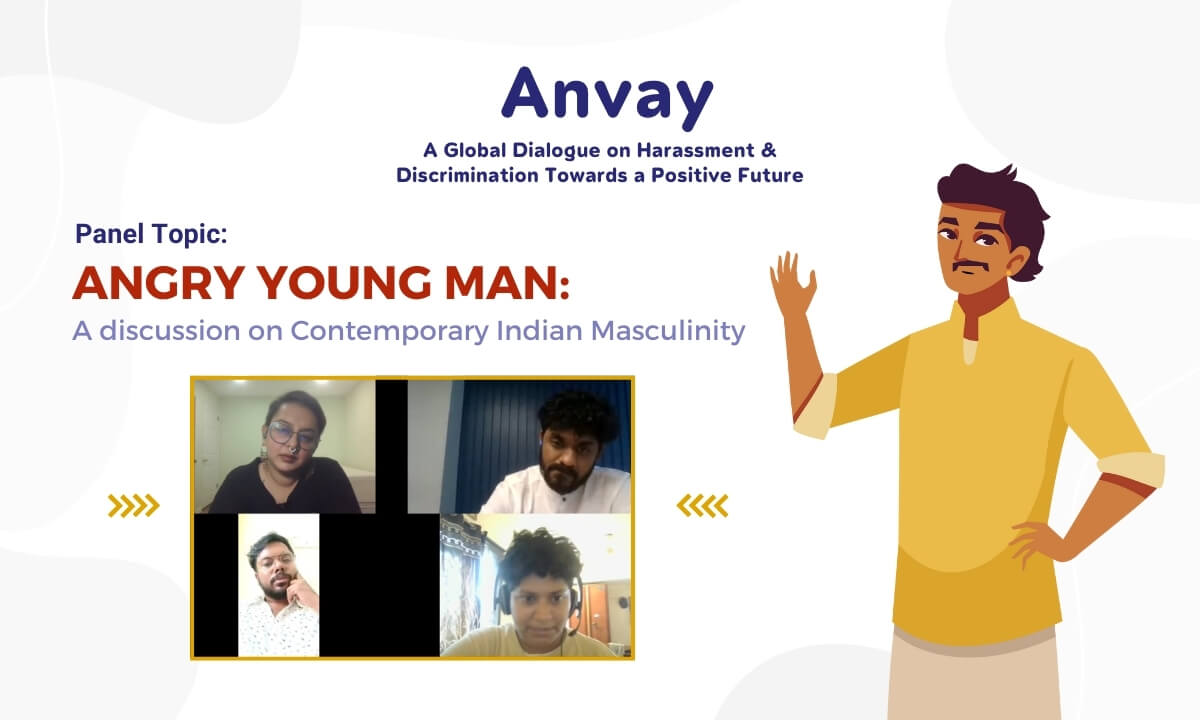At Anvay, 2023, one of the key panel discussions “Angry Young Man: A discussion on Contemporary Indian Masculinity,” featured insightful contributions from:
- Vandarkuzhali (They / Them), Founder of Kovai Vaanavil Kootamaippu.
- Busaina Ahamed Shah, Finance Professional.
- Tan (They / Them), Development Professional.
- Vatsal Chorera, Chief Legal & Compliance Officer.
In a rapidly evolving society, the concept of masculinity is undergoing significant scrutiny and transformation, particularly in India. This panel discussion delves into the multifaceted nature of masculinity, exploring how societal norms and expectations shape behaviors and identities. From the pervasive influence of hyper-masculinity to the struggles of queer individuals navigating binary gender roles, we aim to unpack the emotional and psychological ramifications of these constructs.
Current State of Masculinity
- Lack of Healthy Consciousness: Society has not transitioned to a healthy understanding of masculinity, where gender roles are deeply embedded in upbringing and socialization.
- Toxic Traits: Traits such as aggression and emotional suppression are often enforced, particularly within queer communities, leading to harmful expressions of masculinity.
- Binary Notions: The binary perception of gender persists, affecting how individuals express their identities. For instance, dating preferences often favor hyper-masculine traits, sidelining those who do not conform.
- Victim Blaming: Conversations around aggression often devolve into victim-blaming, diluting accountability for harmful actions.
Need for Accountability and Vulnerability
- Peer Accountability: Men are more likely to respond positively to feedback from male peers rather than women, highlighting the need for male-led discussions on accountability.
- Safe Spaces for Vulnerability: There is a significant lack of venues where men can express vulnerability without fear of judgment, which is essential for personal growth and understanding.
Power Imbalance in Households
- Gender Roles: Traditional family structures often impose a power imbalance where men are expected to be the primary earners while women handle domestic responsibilities.
- Financial Independence: Women increasingly seek financial independence to counteract these imbalances and challenge societal norms that dictate their roles.
- Stigmatization of Female Earnings: Women who earn are often questioned about their roles, reinforcing outdated gender norms that dictate men should be the primary earners.
- Pressure on Men: Men face societal pressure to fulfill breadwinning roles, even when they may wish to take on more domestic responsibilities.
- Non-Binary Experiences: Non-binary individuals often struggle with societal expectations that force them into rigid gender roles, leading to feelings of alienation.
- Misconceptions About Masculinity: There is a misconception that masculinity equates to strength and emotional suppression, which can alienate those who do not fit this mold.
Approaches to Change
- Reframing Anger and Aggression: Anger can serve as a catalyst for change if expressed constructively; it is crucial to address underlying issues rather than demonizing the emotion itself.
- Intersectional Understanding: Recognizing that masculinity encompasses a variety of experiences allows for a deeper understanding of how individuals express themselves.
- Psycho-drama Techniques: Utilizing role-reversal exercises can help individuals understand different perspectives and challenge traditional gender norms effectively.
- Access to Justice: Ensuring equitable access to justice across gender, caste, and disability lines is essential for fostering an inclusive society.
- Need for Diverse Role Models: The lack of representation in media and society contributes to confusion about masculinity and its expressions. Positive role models can help bridge this gap.
- Redefining Family Roles: Changing perceptions within family dynamics regarding who performs domestic duties can lead to healthier relationships and societal norms.
The journey toward redefining masculinity in contemporary India is both challenging and promising. As we navigate the complexities of gender roles, it becomes clear that fostering open conversations and creating safe spaces for vulnerability are essential steps in this transformation.
Ultimately, change begins at home and within our communities. By nurturing supportive environments where all genders can thrive, we can cultivate a society that values empathy, cooperation, and respect. This positive evolution not only benefits individuals but also enriches our collective experience, leading to a more harmonious and equitable world for everyone.
Authored by – Gomathi Sridevi Radhakrishnan, Content Writer Intern, The Legal Swan.



